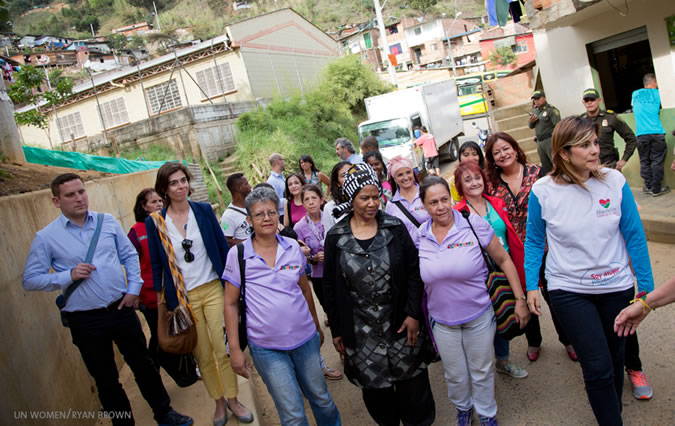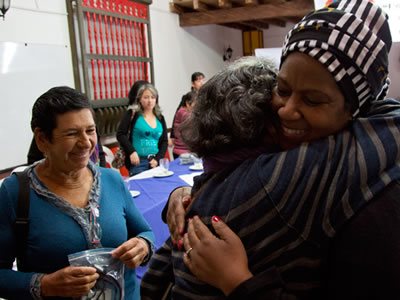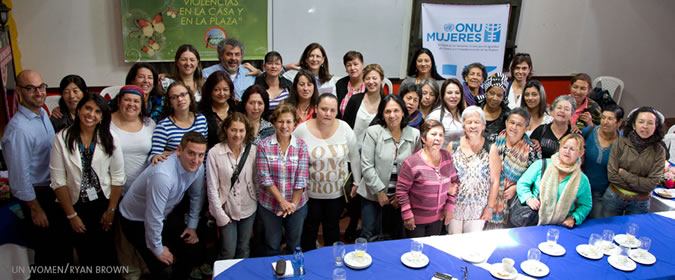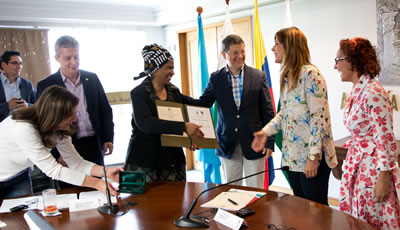On first visit to Colombia, Executive Director meets women survivors and peacebuilders in Antioquia
Date:

During her first visit to Colombia, on 9 May UN Women Executive Director Phumzile Mlambo-Ngcuka received a warm welcome from women survivors of the armed conflict and leading women human rights defenders in the Department of Antioquia.
Ms. Mlambo-Ngcuka started her day with a visit to the town of Marinilla, 50 minutes from Medellín and one of the towns most affected by the armed conflict in this region of Colombia, coveted for its environmental diversity and wealth – generating 30 per cent of all Colombia's hydroelectricity – on top of its rich mining and agro-forestry potential. These assets have historically led to different armed groups vying for control of the area, causing the rural population to move in large numbers to Medellín between 2000 and 2003.
Now, as the national Government and Revolutionary Armed Forces of Colombia - People's Army (FARC-EP) are involved in intensive peace talks in Havana, many of these populations are in the midst of finally returning or being relocated, though the processes are complicated.

In the town of Marinilla, Ms. Mlambo-Ngcuka met with the Regional Association for Women from the East of Antioquia (Asociación Regional de Mujeres del Oriente Antioqueño, known by its Spanish acronym AMOR, which means love), an association for women survivors of the violence in the eastern part of Antioquia. Rural women are working hard to rebuild the social fabric in these regions and mitigate the effects of the conflict on the daily lives of women and their families. They told the Executive Director about the realities they face in access to land, and land tenure, and stressed the importance of economic empowerment for women's development.
“It is through women like you that the discourse of war has changed. The peace process is making a better country, and Colombia needs you to maintain hope,” Ms. Mlambo-Ngcuka told them.

“We feel stronger thanks to the support of the United Nations,” said Azeneth Muñoz, one of the leaders of AMOR.
Her colleague Margarita Quiroz, added: “The entire population has greatly suffered here because of the conflict. We do not want more violence against women and our hope now is that femicide will be prosecuted, because there is still a high level of patriarchy persisting in the courts.”
The Executive Director called the meeting “very moving and touching, because for me, without women there is no peace.”
UNDP Regional Representative Carlos Iván Lopera said: “This is an area that has suffered substantially but is now walking the path of hope, and this is precisely because of the part played by women.”
After this meeting, the delegation returned to Medellín, the second largest city in Colombia, where they were received by local government representatives , headed by the Acting Mayor, the Department of Antioquia Secretary for Gender Equality and the Secretary of Women of Medellín. At these meetings, UN Women’s Executive Director learned about the work the institutions are undertaking to achieve gender equality and the empowerment of women.

Ms. Mlambo-Ngcuka was presented with the keys to the city by Acting Mayor Luis Fernando Suárez, who said: “It is a great honour for the Mayor's Office of Medellín to receive the UN Women delegation, on account of its ongoing work in Antioquia to seek greater well-being for women.”
In her acceptance speech, Ms. Mlambo-Ngcuka said she was very impressed to learn that Medellín and Antioquia had withdrawn all public funds from beauty contests and that these funds were now being used for training to cultivate skills in various fields, such as science for women and girls.
She highlighted the “policies that have been promoted by men and which have been implemented in recent years by the governments of the city of Medellín and the Department of Antioquia. That is a real HeForShe!”
The day ended with a tour through Commune 8, called Villa Hermosa (“Beautiful Town” in English) where she visited the Centre for Gender Equality, one of the projects by the government’s Secretariat for Women, which provides psychological and legal support for women and girls who have suffered violence.
Ms. Mlambo-Ngcuka ended her visit praising the efforts being undertaken in the country towards gender equality saying: “The next generation of Colombia will be better, thanks to the work for peace by women like you.”